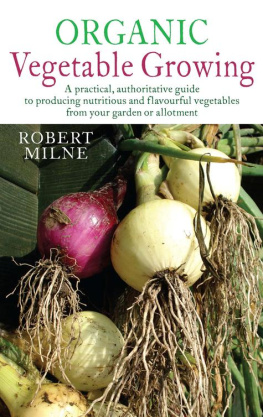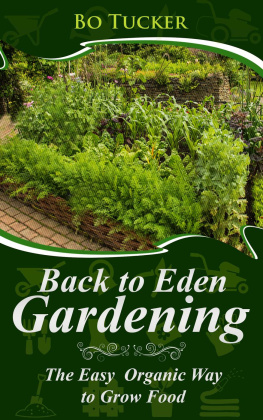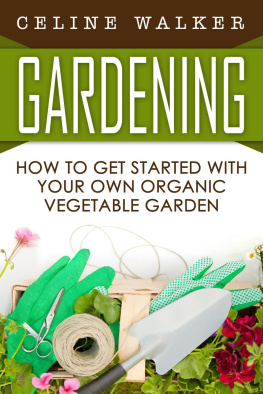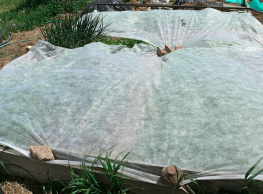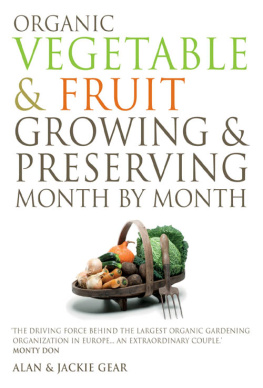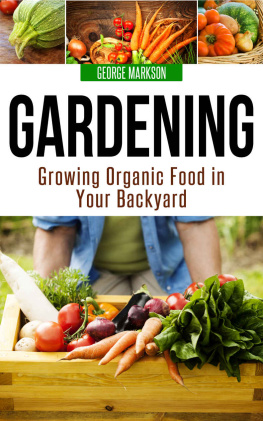Visit our How To website at www.howto.co.uk
At www.howto.co.uk you can engage in conversation with our authors all of whom have been there and done that in their specialist fields. You can get access to special offers and additional content but most importantly you will be able to engage with, and become a part of, a wide and growing community of people just like yourself.
At www.howto.co.uk youll be able to talk and share tips with people who have similar interests and are facing similar challenges in their lives. People who, just like you, have the desire to change their lives for the better be it through moving to a new country, starting a new business, growing their own vegetables, or writing a novel.
At www.howto.co.uk youll find the support and encouragement you need to help make your aspirations a reality.
You can go direct to www.organicvegetablegrowing.co.uk which is part of the main How To site.
How To Books strives to present authentic, inspiring, practical information in their books. Now, when you buy a title from How To Books, you get even more than just words on a page.
To Anna and Henry
Contents
This book is based on 30 years of experience of growing vegetables. The 20 years during which I grew all the vegetables for a family were particularly instructive. Self-sufficiency was time-consuming and unpaid. There was, therefore, a big incentive to find the most efficient way of doing everything and to maximize yield per square metre. In writing this book I have thought through all the things one needs to know and do to get good results and have tried to present this information logically and clearly. It is also important to know when to do what needs doing. Whatever your location and situation latitude, altitude, aspect and soil type there will be a best time. I have tried, therefore, to relate timing, not to calendar dates, but to seasonal conditions.
Doing the right things at the right time, managing the soil to conserve its structure and increase its fertility, knowing how to deter or cope with pests and diseases, will not guarantee success there is always the unexpected but most years most crops will do well. Then the rewards are not just in terms of having tasty, nutritious vegetables to eat but there is enormous satisfaction from simply having grown them yourself.
Many think that gardening is hard work and not worth the bother. Yes, it is hard work but good gardeners know that it is enjoyable hard work; they would not do it if it were otherwise. Nothing is irksome because every job is a necessary part of what has to be done to get the results one wants. Furthermore, even when not in the garden, at any time of day during the growing season you can indulge in the pleasurable awareness that crops are growing, increasing yield every day more grams or kilos of potatoes, longer beans and carrots, and bigger cabbages.
Everyone who picks up this book will already have their own reasons for wanting to grow vegetables. Although based on the experience of the past 30 years I hope the book will be useful as various global processes make food gardening an increasingly relevant and necessary activity, perhaps more a matter of survival than mere lifestyle choice. Current global loss of agricultural land through urbanization (10 million hectares per year) and severe soil degradation (another 10m ha), over-exploitation and pollution of fresh water resources, peak oil, the possible catastrophic loss of productive land as a result of global warming, and the continued rise in population, could, together, result in food shortages on an unprecedented scale. Two generations have passed through the education system since food gardening was treated seriously in schools as part of the rural science course. It seems that those who should expect to live longest in this century are not being given the skills to adapt to it.
An increasing number of schools are taking up gardening, encouraged by the Royal Horticultural Society (RHS) and Garden Organic (the organic growing charity, formerly known as the Henry Doubleday Research Association www.gardenorganic.org.uk) but until gardening is treated as a serious and proper subject, with appropriately trained staff, it will continue to be regarded as peripheral to the curriculum and, therefore, vulnerable to other priorities. Nature and the seasons do not wait for us. Unless the right things are done at the right time results will be poor. Also, school gardens should be at least the size that families would need in order to feed themselves. Only then can a sufficiently wide range of crops be grown and all the techniques taught that are needed to manage a family-sized garden. Children are capable of managing gardens of this size; all they need is to be given the opportunity and the right level of tuition.
One of the motivations for writing this book was the hope that it would be useful to teachers and parents wishing to do gardening with children and young people. Adults in that situation will have a range of knowledge and experience. However, I have made no assumptions; anyone who considers themselves an absolute beginner will, I hope, find all the information they need, not only to create and manage a productive garden as they would for themselves but also included is information particular to the situation of working with children. I hope other readers will not find these brief sections too tedious or, indeed, irrelevant. The book is, essentially, a general vegetable gardening manual but with some extra bits relating to gardening with children, whether in schools or families.
My experience of gardening with upper primary age children has been very encouraging. I was pleasantly surprised by what they wanted to do and proved able to do. Two thoughts emerged. (1) Never underestimate what children can do. Give them challenging tasks. (2) Assume no previous knowledge of gardening; give clear instructions, then unintended disasters should be avoided.
Another observation was that children seem to enjoy quite strenuous physical work. We all need a balance between work which is sedentary and mentally demanding and work which is not just physical but materially productive. Our modern way of life offers few opportunities for many of us and no necessity for children to do productive physical work. Food gardening provides the opportunity for surely the most worthwhile exercise, not that gardening is just physical exercise. The more knowledge you have the better gardener you will be.
At the school gardens where I have worked the children were always very keen to take home bags of vegetables. I can only hope they were as keen to eat them. Having put in the effort to grow the produce I think children will be more interested in eating it than they might be to eat the same sort of food bought from a shop. Especially where green vegetables are concerned, shop-bought produce can never compete for freshness and flavour.
Young children seem to have an affinity with the natural world, before other distractions dominate their attention. All the children I have worked with seemed thoroughly to enjoy being in the garden, even if some were more keen than others on the gardening. However, I suggest that the association of happy experiences with a garden is good conditioning for later interest.
Playing with sand on a beach or in a sand pit at school or playgroup are recognized activities but children will just as happily play with soil, whether as dust or mud. Let them play with soil/dust/mud; let them climb trees and generally explore their surroundings. At the same time their attention may be drawn to the wonders of nature so that they come to appreciate and respect all forms of life.
Gardening may be thought of as vitamin G. When you have the knowledge and skill to get good results, whether in food gardening or flower gardening, engaging in all the activities needed to allow plants to flourish produces a feeling of wellbeing that is hard to describe. The benefits of therapeutic horticulture are well recognized but you do not have to be ill to benefit from gardening. With food gardening, of course, there is a double benefit provided you eat what you grow.

